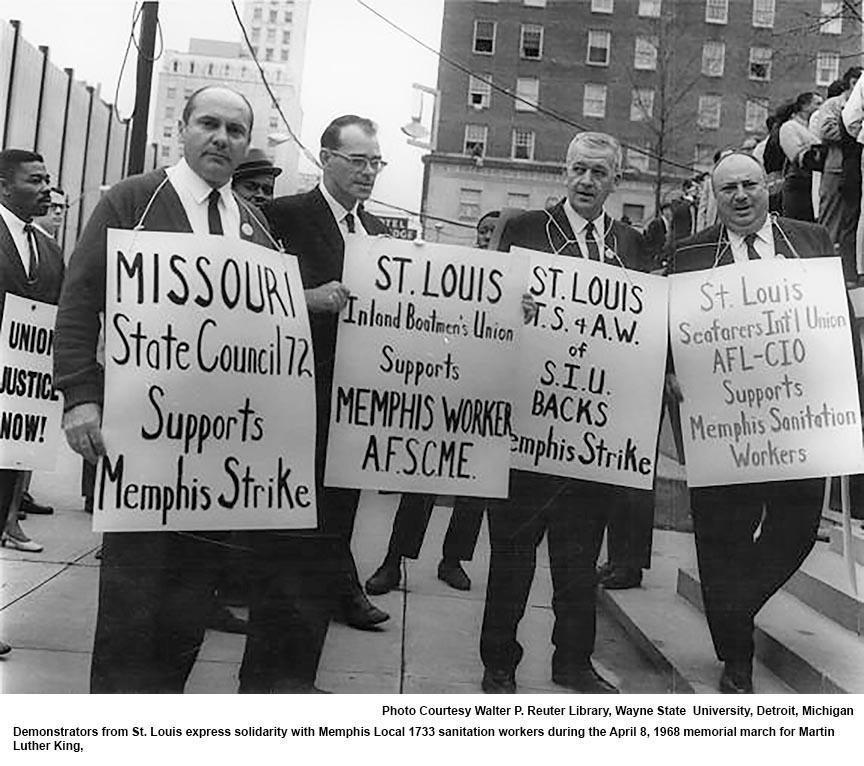Organizations Participate in 2018 Rally for Workers’ Rights
Many Seafarers probably know that the late Dr. Martin Luther King Jr. was assassinated April 4, 1968 while supporting striking sanitation workers in Memphis, Tennessee. What they perhaps don’t know, however, is that the AFL-CIO and a number of its affiliated unions and departments – including the SIU and the Maritime Trades Department – not only backed the sanitation workers’ walkout, they also supported their cause financially and joined them on the picket lines as well.
According to Michael Honey, author of “Going Down Jericho Road” (published 2007) about the 1968 Memphis Sanitation Workers strike, the SIU was among the first unions to show solidarity by sending a weekly donation in support of the strikers.
SIU President Michael Sacco, who also serves as president of the MTD, verified Honey’s account, noting: “Paul Hall (who headed the SIU and MTD in 1968) was a big supporter of the strikers. The MTD and the Seafarers (Union) committed a lot of resources to help those workers.”
Some 50 years following King’s death and the strike’s culmination, the same spirit of solidarity and support for their respective goals continues. MTD Executive Secretary-Treasurer Daniel Duncan, who also is a dues-paying member of the SIU, on April 4, 2018 participated in the Memphis, Tennessee I AM Rally for Justice. This event was part of a weeklong commemoration of the 50th anniversary of the strike and the assassination of Dr. King.
“The three days in Memphis were energizing,” said Duncan. “No matter where you were in Memphis, you saw buttons, shirts, billboards and even buses noting the 50th anniversary of the ‘I AM A MAN’ struggle.
“It was a moment of reflection and remembrance, as well as a time to look ahead to see what goals of Dr. King and the sanitation workers still must be addressed,” he continued. “The spirit surrounding the march on Wednesday was contagious. Folks were celebrating past achievements while calling out for stronger worker rights.”
MTD affiliate AFSCME and the Church of God in Christ organized the week’s events. They received a wealth of assistance from hundreds of officers and rank-and-file members from other labor organizations. “Union members worked with support groups like the NAACP and religious organizations to make sure the 10,000 marchers on April 4 were safe as well as understanding why it was necessary for all of us to gather under the ‘I AM 2018’ banner,” Duncan said.
“Having grown up in Tennessee, I was honored to represent the Seafarers and the Maritime Trades Department at this commemoration,” he concluded.
The original strike, which began in February 1968, followed years of segregation, unfair working conditions, and a history of poor race and labor relations in the city. The spark that set off the strike was the deaths of two sanitation workers, Robert Walker and Echol Cole, who were crushed by a garbage compactor while seeking shelter from a rain storm. Striking workers carried signs with the iconic statement, “I AM A MAN,” which became a rallying cry for their plea for recognition of their human dignity.
The city government would not recognize the union they created, AFSCME Local 1733. Picket lines and daily marches continued for several months, gaining national attention when King joined them. He was killed in Memphis during a trip to support the workers. Shortly after King’s assassination, the city of Memphis recognized AFSCME Local 1733 as the sanitation workers’ union representative.
In reaction to Dr. King’s death, labor leaders from across the nation, including AFL-CIO President George Meany and SIU President Paul Hall, joined government officials and leading figures from all areas of American life in grief and shock.
From Washington, Meany issued a statement that “the murder of Dr. Martin Luther King is an American tragedy. He was killed while aiding striking members of an AFL-CIO union in their struggle for human dignity.
“That is how Dr. King spent his entire life at the side of the most oppressed in this nation,” the federation president declared. “He died in that struggle and all who cherish human dignity mourn tonight.”
Hall, on behalf of the SIU, sent the following telegram to the Reverend Ralph D. Abernathy, Dr. King’s successor as head of the Southern Christian Leadership Conference:
“Americans everywhere join you on this day in mourning the tragic loss in Memphis of a great leader in the struggle for human rights and dignity. The death of Dr. Martin Luther King symbolizes the urgency to continue his life’s work and we wish to assure you of our continued support and dedication in this vital struggle. Please convey to Mrs. King, to her family and to all of your associates our sympathy and sorrow on the loss and untimely passing of this great American.”
Thomas Gleason, head of the International Longshoremen’s Association (ILA), said of the fallen civil rights icon, “He was a man of peace and dignity, completely dedicated to God and the brotherhood of man. It is fitting and proper, then, that we devote this time to pray that the principles that guided this great, great man continue to guide others in the movement for brotherhood to which he devoted his energies.”
The night before his assassination, King gave his famous “I have been to the mountaintop” speech where he also said, “We’ve got to give ourselves to this struggle until the end. Nothing would be more tragic than to stop at this point in Memphis. We’ve got to see it through.”
For two days following his death – April 5 and 6, 1968 – longshoremen and others at ports across the county shut down work in honor of King. This included passenger ships and boats carrying supplies to soldiers in Vietnam. Unions for the workers had been integrated for years, with up to 50 percent of their membership non-white, and the presidents for the National Maritime Union (which merged with the SIU in 2001) and the ILA issued statements calling for the shutdown.

